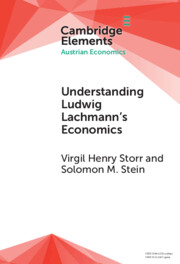Element contents
Understanding Ludwig Lachmann's Economics
Published online by Cambridge University Press: 25 December 2023
Summary
- Type
- Element
- Information
- Series: Elements in Austrian EconomicsOnline ISBN: 9781009083539Publisher: Cambridge University PressPrint publication: 01 February 2024
References
- 1
- Cited by



